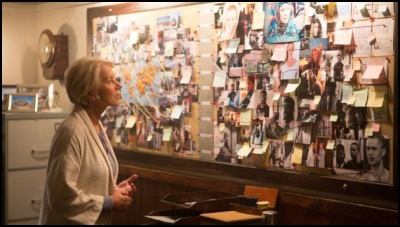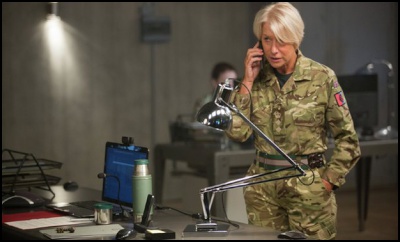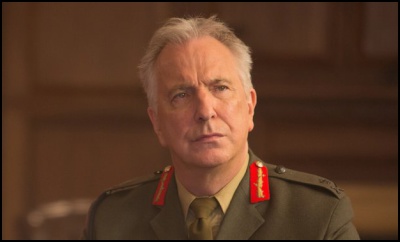Pie in the Sky: The Moral Ambiguity of 'Eye In The Sky'
Howard DavisThe use of UAVs (unmanned aerial vehicles) has prompted both protests and legal action, but few films have engaged in the debate, forgetting there’s someone at the controls and instead emphasizing the alien nature of a remote, robotic death. Colin Firth and Ged Doherty’s Raindog Productions' initial offering, 'Eye in the Sky,' is among the first to explore this morally grey area.

Everyone - from the commanding officers, politicians and the pilots - has their own story to tell. It's simultaneously thought-provoking and gut-wrenching, forcing us to think about how we place value on human lives. Aimed at adults concerned about issues surrounding terrorism, long-distance "surgical strikes," and the trade-off of one life for another, it also questions the widespread use of drones as part of larger surveillance systems. Since Director Gavin Hood used to be a lawyer and his stated intention was to spark a public debate, it's not surprising he's made a movie that derives it's narrative tension by constantly equivocating.
Although the first UAV attack was carried out in Afghanistan by the CIA in 2001, only a few films have subsequently addressed the human cost of killing by remote control. Andrew Niccol’s 'Good Kill' is one, in which Ethan Hawke plays a former air force ace redeployed as a drone pilot and ordered to "prosecute" targets from the comfort of an air-conditioned trailer, thousands of miles from the conflict he is fighting. After many missions, he becomes self-destructive, starts drinking, and scares his wife and kids into moving out. It wasn't afraid of depicting such an intense level of emotional burnout that the US military is now outsourcing this work to private contractors.
Crossing similar territory, 'Eye in the Sky' dramatically maps out the moral and ethical minefield surrounding drone warfare, demanding audiences consider the dire implications of Orwellian "doublespeak." Not since 'Jarhead,' in which Jake Gyllenhaal played a Gulf war sniper constantly thwarted by protocol in his attempt to take his first shot, has so much thought gone into the firing of a weapon on-screen. The UAV viewfinder may have become a familiar sight, we can enact our own virtual operations in video games, we can even watch footage of drone strikes online - but films don't generally invite discussion about whether not someone should be killed. And I can't recall any in which soldiers, spies, and politicians in different locations worry about the moral dimension as the clock ticks down to "zero-hour" in real time.
The target in 'Eye in the Sky’ is a group of al-Shabaab extremists and suicide bombers in a safehouse in Nairobi. They are being monitored by a drone crew commanded by flinty British colonel Katherine Powell (Helen Mirren), who's been tracking one of them for six years. But there’s a laundry list of checks and balances she has to wade through before she can authorize the strike. Since the terrorist targets include both British and American citizens, Powell needs to get clearance from the anxious British Attorney General (Richard McCabe), dithering Defense Secretary (Jeremy Northam), and sphincter-challenged Foreign Secretary (Iain Glen), all of whom have their own legal and political agendas. The drone pilot (Aaron Paul) also has a conscience, insisting on the "collateral damage" report being double-checked before he'll fire, since a young girl is selling bread next to the compound and may be killed by the blast. Powell's only unwavering ally is Lieutenant-General Frank Benson (Alan Rickman), who chillingly delivers the the film's most memorable line with withering disdain- "never tell a soldier he doesn't know the cost of war."

Powell is in constant contact not only with the "rifle, rifle, rifle" triggerman based in his high-tech trailer in the Nevada desert, but also with Benson in London. They endlessly debate the strike's legal and moral ramifications, while the Defence Secretary keeps "referring-up" the big decision to the Foreign Secretary and the Americans. With all these people sitting around in chairs and chewing the scenery (the main actors never met each other on set), it’s a relief to follow Jama Farah (Barkhad Abdi from 'Captain Phillips') on the ground, guiding micro-drones disguised as hummingbirds and flying bugs that supposedly enable positive identification within seconds.
Fortunately, the cast is full of uniformly excellent character actors, none more impressive than Rickman, who sadly died in January and to whose memory the film is dedicated. In a recent Radio Times interview, Mirren (who co-starred with him on stage in 'Anthony and Cleopatra' "rather disastrously") said he would have been proud of his final film performance: "This was the Alan that I know: the witty, thoughtful Alan, rather than the villain that he played so brilliantly." Still stunning at seventy, Mirren also argued that the film explores different sides of the debate and shifts sympathies between characters. When a female politician argues against killing civilians, she justifies her position by the need to score propaganda points: "She comes out with the most unbelievably cynical reasoning … But then again, it’s true - you do have to win the propaganda war. But that’s the beauty of the film. You see the issue from all sides."

The film's fundamental duplicity lies at a much more deeper level, however. The Bureau of Investigative Journalism reveals there have been 423 drone attacks in Pakistan since 2004, with estimates of total deaths ranging up to 4,000, of which 1,000 were civilians and 200 children. Since 2002, the US has confirmed 130 strikes in Yemen, causing about 750 deaths, of which 100 were civilians and at least 10 children. In Somalia since 2007, there have been 28 strikes causing almost 400 deaths. And in the last year alone, Afghanistan has suffered 309 strikes, with almost 2,000 casualties, about 100 of which were civilians and 18 children.
Confronted by such brutal statistics, it's simply inconceivable that each individual drone strike is subject to similar scrutiny. Even if every effort was made to prevent civilian casualties, such convoluted protocols have clearly been a dismal and disgraceful failure. Clive Stafford Smith, director of the pressure group Reprieve, was consulted on the film and remains largely supportive of it, since most Hollywood projects that tackle ethical issues are "milquetoast." But he's equally quick to remind us that it's still a comforting fantasy - "the technology they portray is bullshit … They [the US military] don’t have any of that high-resolution personal identification, which is one reason they screw up so often."
The same topic is explored in the upcoming documentary 'National Bird,' produced by Wim Wenders and Errol Morris, which follows three former drone operators as they reflect on their roles in the fatalities caused by the push of a button. It paints a much bleaker and more realistic picture of a morally confusing world, focussing on low-ranked operators in the "kill chain." Heather Linebaugh, an imagery analyst who became a whistleblower, criticises politicians who promote the use of UAVs without fully understanding what they do to people on the battlefield. Suspicious of video technology that barely lets an operator know if a suspect is carrying a rifle or a shovel, she questions how such life-or-death decisions are made and describes the despair experienced by two colleagues who killed themselves after leaving the USAF. Just another acceptable "cost" of modern warfare?



 Ian Powell: Welcome Puberty Blockers Report But Beware Derailing Transphobia
Ian Powell: Welcome Puberty Blockers Report But Beware Derailing Transphobia Gordon Campbell: On Why We Can’t Survive Two More Years Of This
Gordon Campbell: On Why We Can’t Survive Two More Years Of This Binoy Kampmark: Join The Army; Travel To Exotic, Distant Lands; And Radicalise
Binoy Kampmark: Join The Army; Travel To Exotic, Distant Lands; And Radicalise Ramzy Baroud: Letters from Gaza – ‘Alhamdulillah. We Are Not Okay’
Ramzy Baroud: Letters from Gaza – ‘Alhamdulillah. We Are Not Okay’ Ian Powell: Imperialism, Chagos Islanders And The Fight To Return
Ian Powell: Imperialism, Chagos Islanders And The Fight To Return Binoy Kampmark: Frail Egos And Sandpit Colonialism - Australia, The United States And Invading Iraq
Binoy Kampmark: Frail Egos And Sandpit Colonialism - Australia, The United States And Invading Iraq